Best Electric Hammer Drill — Buyers Guide, Top Picks, and Comparison
Delivering beast-like blows, the ultimate electric hammer drill units make light work of boring into stubborn brickwork, blockwork, and concrete. Promising high impact rates, these mighty machines chip away at masonry while simultaneously providing a rotary action. Often featuring vibration-reducing systems, they ensure your hand, wrist, and arms are shielded from tremor fatigue. Furthermore, the ability to turn off the pounding feature means you can utilize them for standard drilling applications in metal and timber — making them the consummate all-around DIY machine.
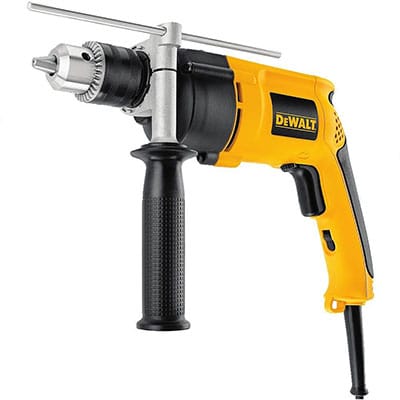
- Compatible with large bits and mixing accessories.
- Powerful 650-watt motor.
- Relatively lightweight at 4.3 pounds.
Electric Hammer Drill Information
Electric Hammer Drill Product Comparison Table
| IMAGE | PRODUCT | DETAILS | ||
|---|---|---|---|---|
|
Best for DIY 
|
Best for DIY
|
DeWalt DW511
|
Features
|
Check Price at Amazon DeWalt DW511 Review DeWalt DW511 Review |
|
Best Corded Hammer Drill for Concrete Impact 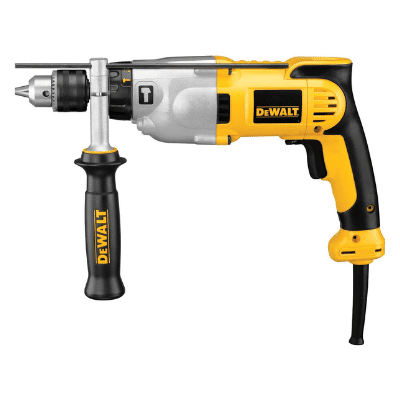
|
Best Corded Hammer Drill for Concrete Impact
|
DeWalt DWD520K
|
Features
|
Check Price at Amazon DeWalt DWD520K Review DeWalt DWD520K Review |
|
Best Lightweight 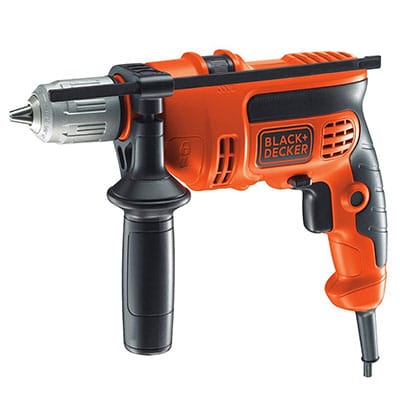
|
Best Lightweight
|
Black & Decker KR 6054 CRESK
|
Features
|
Check Price at Amazon Check Price at Black & Decker Black & Decker KR 6054 CRESK Review Black & Decker KR 6054 CRESK Review |
|
Best Budget 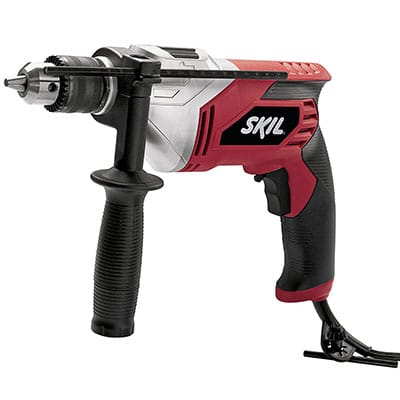
|
Best Budget
|
SKIL 6445-02
|
Features
|
Check Price at Amazon SKIL 6445-02 Review SKIL 6445-02 Review |
|
Best for Speed 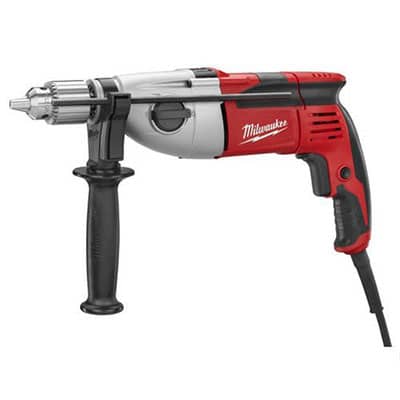
|
Best for Speed
|
Milwaukee 5380-21
|
Features
|
Check Price at Amazon Milwaukee 5380-21 Review Milwaukee 5380-21 Review |
|
Best Complete Kit 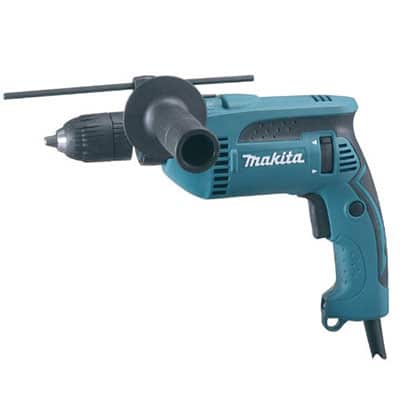
|
Best Complete Kit
|
Makita HP1641K
|
Features
|
Check Price at Amazon Makita HP1641K Review Makita HP1641K Review |
Best Electric Hammer Drill Buying Guide
When you’re addressing concrete, masonry, or brickwork, you need a tool with some serious pummelling power — epitomized by electric hammer drill machines.
These corded units pack in a mighty punching prowess, allowing you to attack the densest of mediums. More affordable than battery-powered models and delivering more consistent power output, these beasts of brawn permit both hammer and hammer-free action — meaning they’re suitable for timber, metal, and masonry applications.
Utilizing an internal clutch, corded hammer drills pound while they bore — breaking-down hardcore materials that would otherwise be too substantial for a standard electric drill.
When selecting your ultimate corded hammer drill, I recommend checking out:
- Impact per minute rate.
- Vibration reduction measures.
- Top speed.
- Speed settings.
- Keyless or keyed chuck.
- Mains cord length.
- Additional accessories included with the tool.
Electric Corded Hammer Drill vs Electric Rotary Hammer Drill
Perhaps the greatest confusion that surrounds hammer drills is how they differ from rotary hammer machines. Generally speaking, they fulfill a similar methodology and application — delivering a pounding action that permits you to drive into concrete and brickwork.
Where they differ is in the mechanics of the pummelling feature. Standard electric hammer units — as discussed in this article — utilize a gear-based clutch to create the punching motion. Conversely, rotary hammer tools boast a twin-piston mechanism to pound dense materials.
Referred to by experts as drive and flying pistons, these components create an internal air cushion — turning the machine into a powerful electro-pneumatic tool, much like a handheld jackhammer.
The benefit of the rotary hammer is that it delivers more force than a traditional hammer unit can provide — making it more suited to seriously stubborn materials and ideal for use as a demolition tool as well as a borer. An application that’s impossible with a standard hammer drill.
Do You Need a Corded Electric Hammer Drill?
Should your projects involve driving into brickwork, concrete, or masonry — it’s sensible to invest in a hammer drill. Not only can these tools attack dense materials with their pounding action — but you can also turn off the battering feature and utilize it as a standard drill.
For many users, this can mean that they’re the ultimate DIY machine — offering sufficient multi-medium versatility for the majority of home and garage projects.
Benefits of a corded electric hammer drill include:
- Affordability — easier on the pocket than rotary hammers.
- Suitable for dense brickwork and concrete.
- Choice of rotary or rotary hammer function.
- High speeds.
- Impressive impact rates.
- Choice of either keyed or keyless chuck.
- Typically feature vibration busting technology.
- Multi-medium compatible.
- Excellent all-around DIY units.
How to Choose the Best Corded Hammer Drill
Hence, when selecting your optimum corded hammer tool, I recommend checking out:
Impact Rate
Perhaps the most crucial consideration. The impact rate, typically measured in bpm (blows per minute), indicates how many times the drill bit pummels your target material every sixty seconds.
Generally speaking, the greater the number of blows, the more efficiently you will plow through dense concrete and brickwork. Bear in mind, the more aggressive the machine, the more effort it requires to wield. A model such as the DeWalt DWD520K knocks out an eye-watering 56000 bpm — making it ideal for tackling hardcore mediums.
Anti-Vibration
Repetitively punching into concrete not only punishes your target material, but also your drill, hands, wrist, and arms.
The substantial forces generated by your power hammer drill send oscillations through the tool casing and into your limbs — tremors that increase the risk of wear and tear on your machine and can induce physical pain and aches.
Many high-end hammer drills corded models — such as the Milwaukee 5380-21 — boast anti-vibration systems, often abbreviated to AVS. This arrangement of shock-absorbers, springs, padding, and grips elevates your unit’s durability and shields you from fatigue.
Maximum Speed
Broadly speaking, the more rapid the rotation of the bit, the faster you can drill and drive. While perhaps not so crucial when addressing masonry, if you’re utilizing the tool with the hammer action disengaged, it can be a welcome aid for repetitive timber boring.
In my opinion, the best hammer drill corded examples should be able to deliver a minimum of 3000 rpm — such as the SKIL 6445-02.
Speed Settings
However, premium-grade examples will typically feature two or more drill velocity modes — effectively acting as limiters on the driving intensity. This permits you to select the maximum upper speed, ensuring that your hammer action enthusiasm doesn’t lead to over-drilling and damage to your base medium.
Keyed or Keyless Chuck
Charcoal or propane grill? Football or baseball? Large or small breasts? Controversial issues that guys have debated amongst themselves for years. You can add keyed or keyless chuck to these difficult issues.
The biggest advantage of a keyless chuck — exemplified by the Makita HP1641K — is that you don’t need a key to secure the bit. This means that you don’t suffer the headaches and frustrations of a delayed project trying to find this crucial tool accessory — which you will undoubtedly have lost.
While perhaps more inconvenient, a keyed chuck drill — for example, the DeWalt DW511 — adds a greater degree of bit security, allowing you to tackle seriously dense mediums without the risks of spinning and sticking.
Cord
Unlike battery-powered hammer drills, corded models require you to be tethered to a mains outlet. This can restrict your operational freedom, require you to be near a power supply, and make high-level work challenging and hazardous.
Therefore check the length of the lead supplied with the hammer drill — at minimum, seek out a unit with a six-foot length. Additionally, check the amperage specification of the tool — as you will need to ensure any extension cables are suitably rated to meet the current draw of your machine.
Additional Accessories
One of the attractions of corded machines over their cordless counterparts is that they can all be operated straight-outta-the-box — as many battery-driven models require you to purchase cells and chargers separately.
That said, many of the best mains-lead units arrive with a variety of additional accessories — items that can save you future purchases, allow you to own an affordable complete kit, and enhance your hammer drilling experience. The Makita HP1641K is a complete masonry attacking kit with a multitude of equipment.
Items I recommend looking out for include:
Cord protector — adding durability at the meeting point of cord and machine.
Hard carry case — to protect your unit and provide convenient portability.
Depth gauge — to shield against over drilling.
Lubricant — to keep the moving parts sufficiently oiled.
Auxiliary handle — permitting two-handed use.
Conclusion
When your projects include drilling into concrete and masonry — you need a corded hammer drill.
With high-impact pummeling action, these tools make light work of the densest materials. Typically boasting anti-vibration features, they stave off fatigue while shielding the internal components.
And, a choice of rotary or rotary with hammer modes allows you to address masonry, timber, metal, or plastic — making them the consummate DIY boring machine.
Admittedly, they’re not for everyone. For serious hardcore on-site use, especially projects that involve demolition, a rotary hammer unit would be more suitable. Additionally, some users may prefer the convenience and added portability of a cordless hammer machine.
However, if you need a dense medium compatible unit that offers consistent power — I recommend getting hold of an electric hammer drill.
Electric Corded Hammer Drills FAQs
Q: What Is the Best Hammer Corded Electric Drill?
In my opinion, and as agreed with by many online corded hammer drills reviews — the best machine on the market is the DeWalt DW511. It boasts a 0.5-inch chuck, 46000 bpm, and an included auxiliary handle.
Q: Can a Hammer Drill Be Used as a Regular Drill?
Yes! Virtually all electric corded hammer drill units permit you to turn off the hammer function — allowing you to address materials such as metals, plastics, and timbers.
Q: What Do You Use a Hammer Drill For?
Delivering a pounding action in addition to a traditional rotary function, hammer electric drills are used for driving into dense materials such as brickwork, concrete, and masonry.
Q: What Is the Best Electric Corded Hammer Drill for Concrete?
As recommended by many electric hammer drill reviews, one of the best machines for addressing concrete is the DeWalt DWD520K. It boasts a grunty 10-amp motor, 56000 bpm, and a top speed of 3500 rpm.
Q: How Long Can You Use a Hammer Drill For?
Industry experts recommend that you don’t continuously use any vibrating hand tool for a period exceeding 15 minutes — to prevent vibration damage to your hand, wrist, and arms.
Q: Whats the Difference Between Hammer Drill and a Rotary Hammer Drill?
A standard corded hammer drill uses a clutch to provide the pummeling action, whereas a rotary hammer drill utilizes twin pistons to create the pounding motion. Rotary hammers are more powerful than standard machines and are suitable for demolition work.
